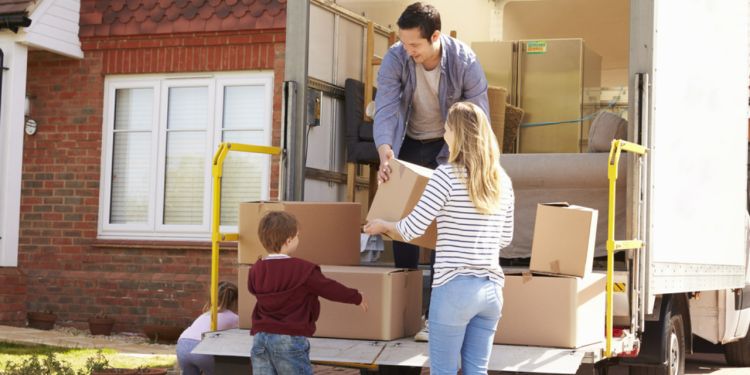
Moving to a foreign country is an endeavor filled with both excitement and challenges. If you´ve set your sights on relocating to Spain and its sunny climes, we've got a few tips to help your move go smoothly. One of the keys to getting it right is moving your possessions safely from one country to another.
Transporting your possessions to Spain
When it comes to relocating possessions to Spain, there are several options available for expats. These include driving yourself, hiring someone, or using freight services.
Driving yourself
Some expats choose to relocate their possessions to Spain by driving themselves. This option is more suitable for individuals or families who prefer a hands-on approach and have a few belongings to transport. It offers flexibility in terms of timing and allows you to control every aspect of the move. However, keep in mind that long-distance driving can be tiring and stressful, especially if you are not familiar with the routes or country's driving regulations.
Hiring someone
Another option is to hire professional movers or a removal company to handle the relocation process on your behalf. These companies specialize in packing, transporting, and setting up your possessions at the final destination. Hiring professionals can take a significant weight off your shoulders, as they have the necessary expertise and equipment to ensure a smooth move. However, it is vital to research and choose a reputable company with experience in international relocations to Spain.
Using freight services
Freight services are popular for moving a large number of possessions and/or bulk items. Companies specializing in international freight can transport your belongings via sea or air cargo. Sea freight is typically more cost-effective for larger shipments, while air freight is faster but can be pricier. Freight services handle the logistics, paperwork, and customs clearance procedures, making the process more convenient for expats. However, you may need to organize land transportation to move your possessions to and from ports or airports. In some cases, train freight may be possible.
Choosing a removal company when relocating to Spain
When choosing a removal company, you need one that treats your possessions like theirs. With so many out there, it can be difficult to know which one to trust with your belongings. To help you narrow down your options, consider the following:
Check for licensing and certifications: Ensure your chosen removal company is properly licensed and certified to operate internationally. Look for certifications such as FIDI (Fédération Internationale des Déménageurs Internationaux) or BAR (British Association of Removers) membership.
Request quotes and compare prices: Contact the shortlisted removal companies and request detailed quotes for your specific move to Spain. Compare the prices, taking into account services provided, insurance coverage, and additional charges for customs clearances or other requirements.
Look for experience and expertise: Opt for a removal company that has extensive experience in international moves to Spain. Experienced companies will be familiar with the necessary paperwork, customs requirements, and potential challenges.
Review customer testimonials: Read customer testimonials or reviews on independent review platforms. This will provide insights into the company's reputation, reliability, and quality of service.
Inquire about handling customs procedures: International moves involve various customs procedures, documentation, and regulations. Ensure that the chosen removal company has experience in handling the customs processes in Spain to avoid any delays or complications.
Check for additional services: Consider any additional services you may require, such as packing, storage, or pet transportation. Ensure the removal company can accommodate these additional needs and inquire about associated costs.
Evaluate customer support: Assess the responsiveness and professionalism of the removal company's customer support team. Prompt communication and assistance during the entire moving process can greatly reduce stress and ensure a smooth relocation experience.
Obtain recommendations: Seek recommendations from friends, colleagues, or members of online expat forums who have previously relocated to Spain. Their firsthand experiences and insights can help you make an informed decision when choosing the right removal company.
Good to know:
Many relocation companies will happily provide you with a free, no-obligation quote.
Among the factors that will contribute to this estimate are:
- The pickup address where removers will pack and load your belongings;
- The volume of your possessions (how much space they will take up);
- The type of transport needed, i.e., air, train, truck, or ship;
- The moving date;
- Insurance covering your items during transit.
Good to know:
Some removal companies offer international shipment tracking and international pet shipping services.
Catalog the belongings you will bring to Spain
Assess what items you want to bring to Spain. Make an exhaustive inventory of your belongings to ensure you only take items that are essential to you. There's no point paying removers to carry things you no longer need. Your audit will also help you establish a 'declaration of value,' an important document that sets the compensation amount you could receive in case of loss or damage.
Here are a few pointers to help you:
Start early: Catalog your belongings as soon as you know you are relocating to Spain. This will give you ample time to evaluate and organize them properly.
Categorise items: Divide your belongings into different categories, such as furniture, electronics, kitchenware, clothing and personal items. This will make it easier to keep track of everything during the moving process.
Use a spreadsheet: Create a detailed spreadsheet or inventory list that includes item descriptions, quantities, and their current condition. You can also add any special notes, like fragile items or sentimental value.
Take photographs: Alongside your inventory list, take pictures of valuable or unique items. This will serve as visual documentation to prove their condition and help with any insurance claims or disputes that may arise during the move.
Number or label boxes: Clearly mark each box with a unique number or label and list the contents on your inventory list. This simple step will save you a lot of time and effort when unpacking in your new home.
Declutter before packing: Moving is an excellent opportunity to declutter and get rid of unnecessary items. As you catalog your belongings, separate those you no longer need or want. Consider donating, selling, or disposing of them appropriately.
Organize important documents: Create a separate section in your catalog for important documents like passports, medical records, birth certificates and legal paperwork. Ensure these are safely stored and easily accessible during and after the move.
Pack an essential box: Prepare an essential box or suitcase that contains items needed immediately upon arrival in Spain. Include toiletries, a change of clothes, important documents, chargers, and anything else that'll be crucial for the first few days in your new home.
Remember, organizing and cataloging your belongings not only simplifies the moving process but also helps safeguard your items and provides peace of mind during the transition to your new life in Spain.
Insuring against potential damage when relocating to Spain
Moving involves numerous risks and uncertainties, both during transit and after arrival. Therefore, it would be best if you had international removals insurance to cover potential damage to your items.
Regardless of how careful you are, accidents can happen during the transportation of your belongings to Spain. Theft, fire, natural disasters, or even road accidents can result in the loss or damage of your possessions.
Moving internationally also often involves complex logistics. Your belongings may need to be transported via multiple modes of transportation, including trucks, ships, or aircraft. This increases the likelihood of loss or damage due to mishandling, improper packing, or unforeseen circumstances. Insuring your goods allows you to minimize potential financial setbacks and ensure their replacement or repair.
Ultimately, insurance gives you peace of mind knowing that in case of any unfortunate events, you are financially protected. It allows you to focus on other aspects of your move without constantly worrying about the safety of your possessions.
Good to know:
Some relocation companies offer insurance policies; others don't. Whether they do or not, it is prudent to shop around and compare policies. If your possessions are held in storage before being taken to your Spanish home, check if your insurance covers this.
Importance of the waybill when relocating to Spain
A waybill is a document that is used in the shipping and logistics industry to detail the contents, origin, and destination of a shipment. It will be issued by your carrier and will detail among other things:
- The terms and conditions of the contract with the removal company;
- The mode of transportation;
- The volume or weight of your goods;
- Your name and address and those of the carrier.
When you sign the document, you agree to these terms and conditions and permit the removal company to go ahead.
Important:
In general, relocation carriers will take care of all the paperwork associated with your move, such as customs forms. For peace of mind, choose a removal company affiliated with the FIDI (International Federation of International Movers).
Good to know:
For more information about relocation, such as customs regulations and prohibited items, contact the Spanish embassy in your home country. Your removal and relocation carrier should also be able to answer your queries.
Packing up your possessions before relocating to Spain
Some carriers will offer a packing service for an additional fee. But if you´re looking to save money or are handling your own move, here are some helpful tips to protect your belongings:
Packing for an international move takes time and careful planning. Begin the process well in advance to avoid any last-minute rush or anxiety.
Invest in sturdy moving boxes, bubble wrap, packing paper, and packing tape to ensure the safety of your belongings during transit. Fragile items should be securely wrapped and cushioned.
Pack heavy items at the bottom, light items on top: When packing boxes, place heavy items at the bottom and lighter ones on top. This will prevent damage to fragile belongings and make lifting and transporting boxes easier.
If you have valuable or sentimental items, consider carrying them with you personally during the move. This way, you can ensure their safety and avoid any potential loss or damage.
Maximize the space in your boxes by filling gaps with smaller items or clothing. This will help prevent shifting and potential damage during transit.
Before packing electronic items or furniture, take photos or make a note of their condition. This will serve as valuable proof for insurance claims in case of damage during the move.
What can you leave behind when relocating to Spain?
Moving home is always a good excuse to clear out things you don't want or need anymore. It may be wise to leave behind any heavy or bulky furniture that can be costly to ship overseas. Additionally, electrical appliances that do not meet Spanish voltage requirements may be more trouble than they are worth bringing along.
Another item you may consider leaving behind is your car. Shipping a vehicle internationally can be quite expensive, and the process of registering and insuring a car in Spain can be complex. Instead, it may be more cost-effective to sell your car before moving and purchase a new one once you've settled in Spain.
Sell or give to charity the things you won't be taking with you. When in Spain, you go on a shopping spree for new items.
Good to know:
If you want to buy furniture, appliances and other items for your home in Spain, you'll be spoilt for choice for shops, department stores and websites, for example, IKEA, Amazon, Carrefour, El Corte Ingles, in addition to lots of independent stores. Consider Wallapop, Milanuncios and local flea markets for second-hand items.
Store digital backups
Don´t forget all your paperwork! Back up important files and documents digitally. Scan and save copies on a secure cloud storage platform or an external hard drive. Doing so ensures they´re protected against physical mishaps like loss or damage during transportation. By having digital copies, you can quickly retrieve and replace any missing paperwork, minimizing potential setbacks and disruptions in your new country.
Additionally, cloud storage solutions offer advanced encryption and password protection, enhancing the security of your documents and preventing unauthorized access or identity theft. In cases of emergencies or unexpected events, accessing and presenting digital copies of documents can save time and effort in resolving any urgent matters.
Useful links:
FEDEMAC - Federation of European Movers
We do our best to provide accurate and up to date information. However, if you have noticed any inaccuracies in this article, please let us know in the comments section below.












Comments